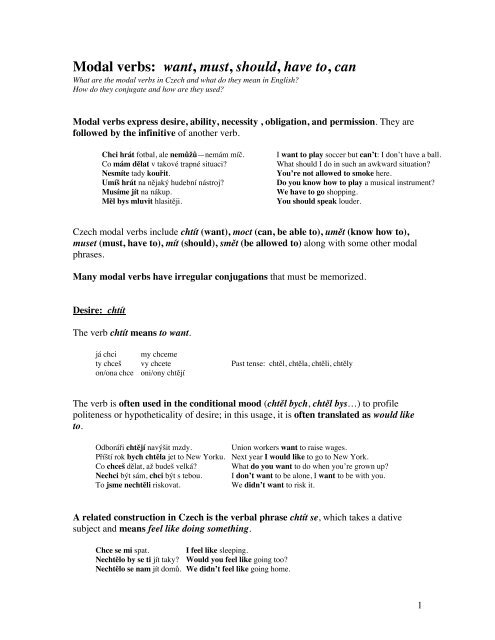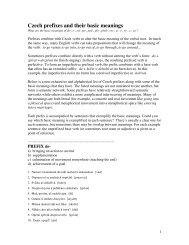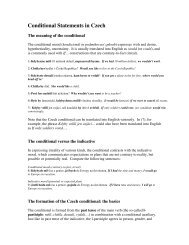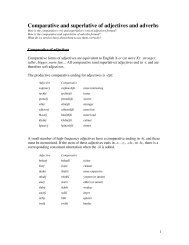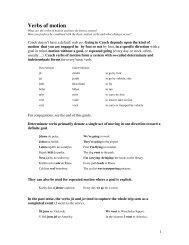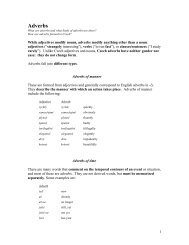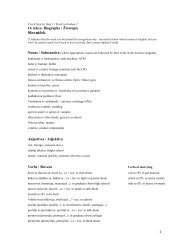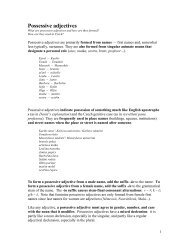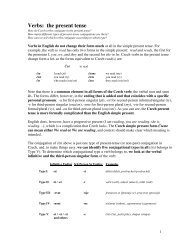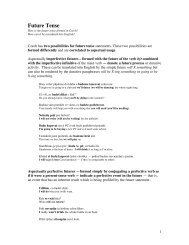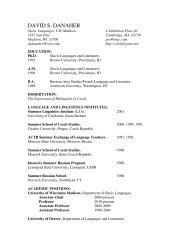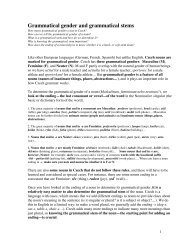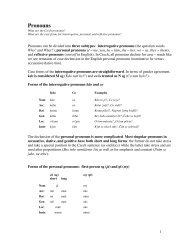Modal verbs: want, must, should, have to, can - Cokdybysme.net
Modal verbs: want, must, should, have to, can - Cokdybysme.net
Modal verbs: want, must, should, have to, can - Cokdybysme.net
- No tags were found...
You also want an ePaper? Increase the reach of your titles
YUMPU automatically turns print PDFs into web optimized ePapers that Google loves.
<strong>Modal</strong> <strong>verbs</strong>: <strong>want</strong>, <strong>must</strong>, <strong>should</strong>, <strong>have</strong> <strong>to</strong>, <strong>can</strong>What are the modal <strong>verbs</strong> in Czech and what do they mean in English?How do they conjugate and how are they used?<strong>Modal</strong> <strong>verbs</strong> express desire, ability, necessity , obligation, and permission. They arefollowed by the infinitive of another verb.Chci hrát fotbal, ale nemůžů—nemám míč.Co mám dělat v takové trapné situaci?Nesmíte tady kouřit.Umíš hrát na nějaký hudební nástroj?Musíme jít na nákup.Měl bys mluvit hlasitěji.I <strong>want</strong> <strong>to</strong> play soccer but <strong>can</strong>’t: I don’t <strong>have</strong> a ball.What <strong>should</strong> I do in such an awkward situation?You’re not allowed <strong>to</strong> smoke here.Do you know how <strong>to</strong> play a musical instrument?We <strong>have</strong> <strong>to</strong> go shopping.You <strong>should</strong> speak louder.Czech modal <strong>verbs</strong> include chtít (<strong>want</strong>), moct (<strong>can</strong>, be able <strong>to</strong>), umět (know how <strong>to</strong>),muset (<strong>must</strong>, <strong>have</strong> <strong>to</strong>), mít (<strong>should</strong>), smět (be allowed <strong>to</strong>) along with some other modalphrases.Many modal <strong>verbs</strong> <strong>have</strong> irregular conjugations that <strong>must</strong> be memorized.Desire: chtítThe verb chtít means <strong>to</strong> <strong>want</strong>.já chci my chcemety chceš vy chcete Past tense: chtěl, chtěla, chtěli, chtělyon/ona chce oni/ony chtějíThe verb is often used in the conditional mood (chtěl bych, chtěl bys…) <strong>to</strong> profilepoliteness or hypotheticality of desire; in this usage, it is often translated as would like<strong>to</strong>.Odboráři chtějí navýšit mzdy.Příští rok bych chtěla jet <strong>to</strong> New Yorku.Co chceš dělat, až budeš velká?Nechci být sám, chci být s tebou.To jsme nechtěli riskovat.Union workers <strong>want</strong> <strong>to</strong> raise wages.Next year I would like <strong>to</strong> go <strong>to</strong> New York.What do you <strong>want</strong> <strong>to</strong> do when you’re grown up?I don’t <strong>want</strong> <strong>to</strong> be alone, I <strong>want</strong> <strong>to</strong> be with you.We didn’t <strong>want</strong> <strong>to</strong> risk it.A related construction in Czech is the verbal phrase chtít se, which takes a dativesubject and means feel like doing something.Chce se mi spat. I feel like sleeping.Nechtělo by se ti jít taky? Would you feel like going <strong>to</strong>o?Nechtělo se nam jít domů. We didn’t feel like going home.1
Necessity: musetThe verb muset means <strong>must</strong>, <strong>have</strong> <strong>to</strong>.já musím my musímety musíš vy musíte Past tense: musel, musela, museli, muselyon/ona musí oni/ony musí/musejíThe necessity evoked by muset is dictated by an external force or authority: there isoften no choice but <strong>to</strong> comply or there is an ethical imperative <strong>to</strong> do something.Romové musejí dostat šanci.To musíš vědět.Musíme si pomáhat.Musel jsi zavolat sanitku?The Roma <strong>must</strong> <strong>have</strong> a chance.You <strong>have</strong> <strong>to</strong> know this.We <strong>have</strong> <strong>to</strong> help each other.Did you <strong>have</strong> <strong>to</strong> call an ambulance?Obligation: mítThe verb mít means <strong>to</strong> <strong>have</strong>, but it <strong>can</strong> be used modally and followed by an infinitive<strong>to</strong> indicate obligation. The modal meaning is <strong>should</strong>, ought <strong>to</strong>, <strong>have</strong> <strong>to</strong>. It differs frommuset in that the obligation is more attenuated or less external and more internal.In its modal usage and its <strong>have</strong> usage, mít has exactly the same conjugation. In its modalusage, it often occurs in the conditional (měl bych, měl bys…).Co bych měl vědět?Co máme dělat?Máš si najít jiného.What <strong>should</strong> I know?What <strong>should</strong> we do?You <strong>should</strong> find someone else.Permission: smětThe verb smět means <strong>to</strong> be allowed <strong>to</strong>; its opposite (<strong>to</strong> be prohibited) is nesmět.já smím my smímety smíš vy smíte Past tense: směl, směla, směli, smělyon/ona smí oni/ony smějíEnglish doesn’t <strong>have</strong> a good equivalent for the economic and efficient smět, andtranslations vary.Smím tady kouřit?Nesměli jsme si sednout.To se nesmí a pes <strong>to</strong> ví!Can I smoke here? (Am I allowed <strong>to</strong> smoke here?)We weren’t permitted <strong>to</strong> sit down.That is not allowed and the dog knows it!3
Kritizovat smite, ale bez nádavek. You <strong>can</strong> criticize, but without insults.Aspect and modalsAll modal <strong>verbs</strong> are imperfective only. They thus <strong>have</strong> only imperfective futures(budu, budeš, bude… plus modal infinitive).Řekl ti někdo, kdy budeš moct jít domů?Jsem čestný, asi budu chtít kandidovat.Od té doby se už nebudeme muset bát.Did anyone tell you when you’ll be able <strong>to</strong> go home?I’m honest so I’ll probably <strong>want</strong> <strong>to</strong> be a <strong>can</strong>didate.From then on we’ll no longer <strong>have</strong> <strong>to</strong> be afraid.Examples of usageBelow are examples of usage of the modal <strong>verbs</strong>. Where is the modal verbal and what dothe sentences mean?1. Až budeme spolu všichni telepaticky komunikovat, už nebudeme muset skrývat své myšlenky.2. Uměla jsi už dobře portugalsky, když jsi tam jela?3. Nechce se mi jít do práce.4. Šéf nechce ods<strong>to</strong>upit.5. Musíme vždycky odporovat zlu.6. Neměli byste <strong>to</strong>mu věřit.7. Na Balkáně nemají elektřinu, musejí <strong>to</strong>pit dřevem.8. Když se stáhnu mp3 z webu, můžu jít do vězení?9. Nás pes smrdí: co s ním máme dělat?10. Co mám dělat, když nemůžu spat?11. Doma smíte mít šest rostlin marihuany, za více budete potrestáni.12. Já jsem rád, že se nebudu muset učit celé dějiny českého jazyka, pro<strong>to</strong>že <strong>to</strong> by mě nejspíš zabilo.13. Studenti pak byli líní, nechtělo se jim mluvit anglicky.14. Máte si najít trénera.15. Vždycky jsem se o sebe uměla postarat.16. Chtěla bych vás poprosit o pomoc.17. Doufáme, že nebudeme muset stávkovat vůbec.18. Bez lásky se nedá žít.19. Život je velké jeviště, na kterém musíš hrát.20. Co Češi nevědí — ale měli by!4


